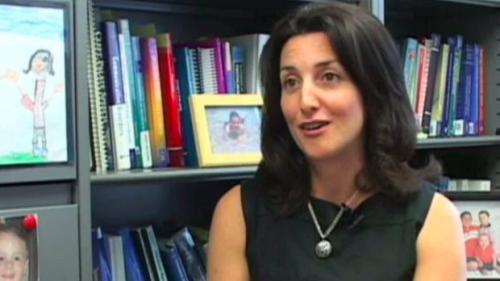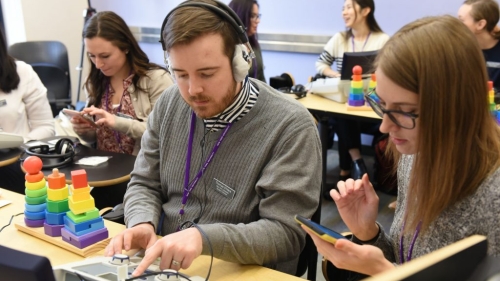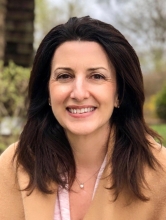This fellowship—which is retained for life—is one of the highest honors bestowed by the American Speech-Language-Hearing Association.

Dr. Maria Grigos
Associate Professor and Chair of the NYU Steinhardt Department of Communicative Sciences and Disorders Maria Grigos has been selected as a 2020 American Speech-Language-Hearing Association (ASHA) Fellow – a lifetime honor that recognizes outstanding professional or scientific contribution to the field of speech-language pathology beyond one’s community or state.
We connected with Dr. Grigos to talk about this accomplishment.
Congratulations on being named an ASHA Fellow! What does this recognition mean to you?
I am humbled and honored to join a distinguished group of past recipients, so many of whom I have considered mentors over the years. Day to day, I engage in work that I love and that I am incredibly passionate about – so to be recognized by my colleagues is truly amazing.
What do you consider to be your greatest professional contribution to the communicative sciences and disorders field?
I consider my greatest professional contributions to be in the areas of teaching and mentoring. Over the years I have taught countless undergraduate and graduate students about speech sound development and disorders. I provide students with the tools to explore the relationship between theory and clinical practice as they learn about evidence-based approaches to assessment and intervention. My hope is that this provides a foundation for life-long learning.
My commitment to student learning extends to the laboratory where I have mentored student research at all levels. It is a thrill to work with students to develop their research skills, guide their projects from start to finish, and to see doctoral students, in particular, evolve into independent researchers.
What do you consider to be your greatest scientific contribution as a researcher?
I consider my greatest scientific contribution to be my research on speech motor control in childhood apraxia of speech (CAS), a complex speech disorder that has a profound impact on a child’s ability to communicate. My research quantifies speech motor deficits and motor learning in CAS. This enables us to better understand the motor problems that underlie speech errors in this population. Young children with CAS are known to make very slow progress in traditional treatment that targets individual sounds because they cannot accurately transition between sounds. The results of our research on speech motor learning suggest that the practice of a movement gesture (which targets the timing and movement from one sound to another) may lead to a longstanding change in underlying motor control processes. We are currently exploring this notion further within the context of motor-based speech intervention with the aim of using such research evidence to inform the clinical management of CAS.
How do you plan to continue impacting the field now that you’re an ASHA Fellow?
I am at the beginning of a new five-year project funded by the National Institutes of Health in which we will be studying the efficacy of motor-based speech intervention in young children with CAS. Each research project is the start of a new journey. This work has important theoretical and clinical implications and I am excited to lead my research team, including a group of collaborators and many students, to conduct the work. I am fortunate to teach classes with content that directly aligns with my research. Therefore, I will continue to bring the latest research into my teaching. Lastly, I am entering my second year as Department Chair and look forward to continuing to serve our Department and the School in this leadership role.
What advice do you have for speech-language pathologists at the beginning of their careers?
There are a vast number of opportunities available to speech-language pathologists, from the clinical populations we serve to the wide range of employment settings we work in. Be open to new challenges, stay on top of the latest research, and give back to the profession through supervision. You will find that training the next generation of clinicians will be a great learning experience and very rewarding.
Related Department

Communicative Sciences and Disorders
665 Broadway, 9th floor
New York, NY 10012
Phone: 212-998-5230

